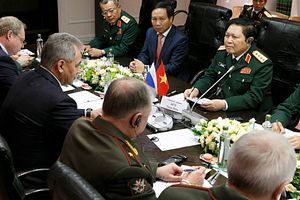Last week, Vietnam’s defense minister embarked on a weeklong visit to Russia. The trip spotlighted the ongoing efforts by both countries to advance aspects of their defense ties amid wider domestic and regional developments.
As I have observed before in these pages, Vietnam and Russia have a defense relationship that dates back to the Cold War, and despite some challenges for ties as Vietnam engages newer partners such as the United States and Russia’s regional and international behavior attracts greater scrutiny, some advances in this realm of ties have continued as Hanoi continues to modernize its military and Moscow seeks a stronger defense presence in the broader Asia-Pacific. That has continued over the past yea as well, whether it be headlines about new Vietnamese orders of Russian equipment or visits that reinforce the continued significance of the relationship for both sides.
Over the past week, the defense aspect of the relationship was in the spotlight again with the visit of Vietnam’s defense minister to Russia. Vietnam’s Defense Minister Ngo Xuan Lich was on an official visit to Russia at the invitation of his Russian counterpart Sergey Shoigu for what was officially dubbed an effort to strengthen the traditional friendship between the two countries and the comprehensive strategic partnership between them.
Lich’s visit, which kicked off on February 3, consisted of a series of interactions. This included meetings with top Russian officials, including Shoigu, visits to Russian military units and the Vietnamese embassy in Moscow, and symbolic engagements such as the laying of wreaths at the Ho Chi Minh Monument and Soviet Nameless Martyrs Memorial in Moscow, Russia.
Per a statement issued by Vietnam’s defense ministry, the meeting between Lich and Shoigu saw both sides take stock of recent developments in relations as well as chart out potential areas of collaboration. In terms of avenues for collaboration, they discussed not only areas of bilateral ties such as exchanges, dialogues, and training, but also wider cooperation including collaboration in multilateral fora – with Vietnam holding both a non-permanent seat at the UN Security Council and the ASEAN chair in 2020 – as well as specific areas such as terrorism (with both sides co-chairing the ADMM-Plus Expert Group on Counterterrorism from 2020 to 2023).
The two ministers also signed the joint vision statement on defense cooperation between the two countries for the 2020-2025 period. While public details on the statement were not revealed, the official statement noted that both countries had agreed to “bolster defense cooperation on the basis of mutual political trust and the signed deals.”
Unsurprisingly, not much in the way of further specifics were issued about the agreement reached by both sides, including more detailed areas of collaboration. And the focus was on opportunities for future collaboration, rather than the inherent challenges that remain for it. Nonetheless, interactions such as the defense minister’s visit this week will continue to be important to watch in the months and years to follow in order to assess the ongoing evolution of Russia-Vietnam defense cooperation within wider ties and amid wider domestic and regional developments.

































